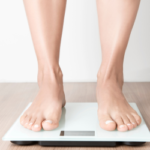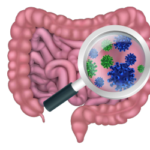I speak to a lot of people who insist that they just can’t lose weight, no matter what they’ve tried with food choices and movement.
If this is you, read on!

For those of you who have made dietary changes, exercising more regularly but still not shifting any weight, it is more than the whole calories in/calories out equation. I know it can feel dismissive to just be told you need to exercise more or eat less when you know there is something else going on.
One of the biggest things that could be contributing to an inability to lose weight could be your gut bacteria, which I’ll be talking about in this post.
Other contributors of weight gain/inability to lose weight
- Thyroid issues
- Hormonal imbalance (sex hormones or satiety hormones)
- Impaired insulin sensitivity
- Chronic stress and cortisol
- Chemical exposure (and lack of clearance of xenoestrogens and other chemicals)
- Parasites, virus and fungi leading to dysbiosis
- Inflammation
I’ll go further into these in a later post.
The gut microbiome and it’s impact on weight
As you’ve probably come across, our gut health has a massive impact on our overall health and the gut microbiome play a major role in this. You’ve also probably heard about “good” bacteria and “bad” bacteria and that the good guys keep the bad guys under control.
Though, there can be too much of a good thing.
Firmicutes are a major phyla of bacteria that play a key role in help keeping us healthy, they are the second largest phyla after Bacteroidetes. An imbalanced ratio of Firmicutes/Bacteroidetes is associated with greater incidences of fat deposition, impaired insulin sensitivity, inflammation and obesity. This is because Firmicutes are better at extracting energy from food, promoting greater absorption of calories, leading to increased weight gain.
So what can be done?
Ideally, you can do a comprehensive GI Mapping  stool test which will give you the ratio of Firmicutes/Bacteroidetes along with much more detailed information about what’s happening with your gut Microbiome, if there are any parasites, fungus or opportunistic bacteria that’s causing issues.
stool test which will give you the ratio of Firmicutes/Bacteroidetes along with much more detailed information about what’s happening with your gut Microbiome, if there are any parasites, fungus or opportunistic bacteria that’s causing issues.
But for those not able to have a consult or afford a test, there are other things you can do to help support your microbiome and increase Bacteriodetes
- Eating polyphenol and fibre-rich foods increases short-chain fatty acids and provides a great food source for Bacteroidetes. These foods include a variety of fruits, vegetables, beans and legumes. If you can’t digest beans, it may be because you have too few Bacteroidetes, so start slow and consider digestive enzymes or bitters to help with digestion
- Increasing protein-rich foods particularly in the morning to stabilise blood sugar levels and increase satiety throughout the day
- Reduce saturated and trans fat intake and processed carbohydrates, this is because Firmicutes feed off of these. Focus on Omega 3 fats instead.
- Sleep plays a vital role in all areas of health, including the gut microbiome as this is affected by our circadian rhythm.
If you are struggling with weight loss, suspect there may be some other gut microbiome issues occurring, or just want to feel better physically, mentally, emotionally and energetically, send me a message as I would love to have a chat.
